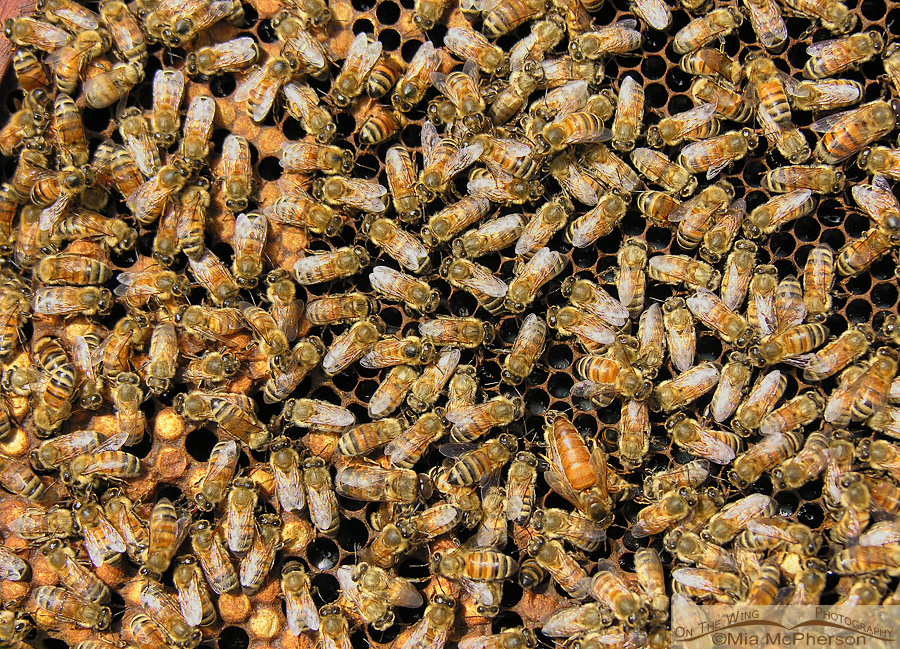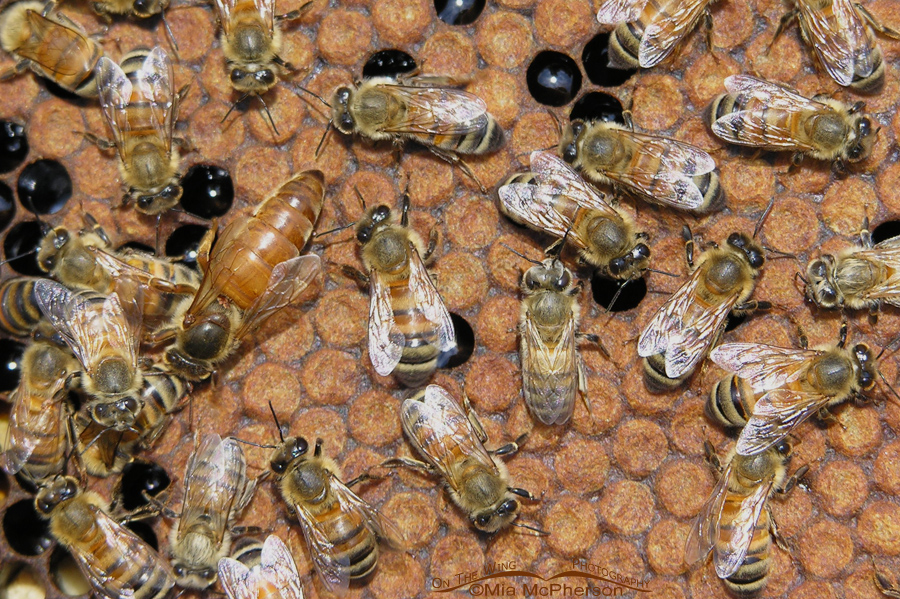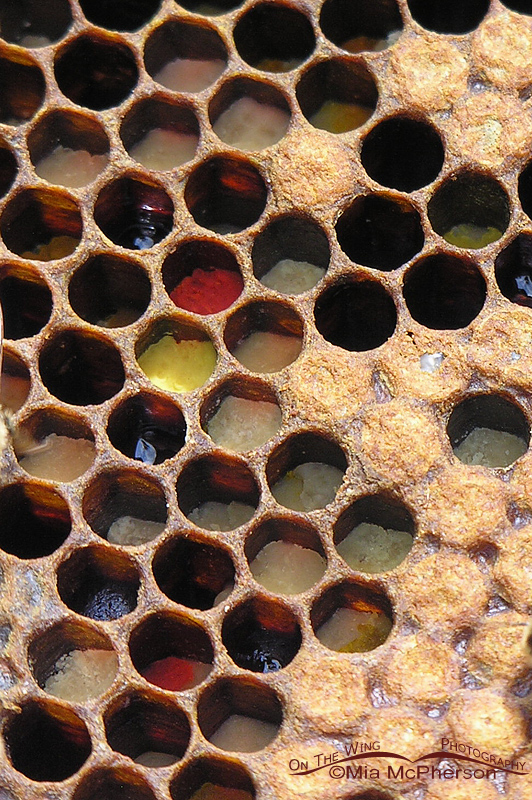 Honey Bees at a hive – Nikon E8800, handheld, f3.6, 1/268, ISO 50, 24mm, natural light
Honey Bees at a hive – Nikon E8800, handheld, f3.6, 1/268, ISO 50, 24mm, natural light
There is currently a loud buzz about Bees, the buzz is in the news, on TV, social media, and conservation sites on the internet. Bee hives are collapsing at alarming rates and a second study by Harvard School of Public Health (HSPH) has provided more evidence that the use of a class of pesticides known as neonicotinoids (sulfoxaflor) is causing these collapses.
Essentially even a minute amount of neonics can cause colony contamination, weakened immune systems in the bees, can interrupt the navigation of bees causing them to be unable to locate their hives and when those bees don’t return to the hive with food the hive starves. Neonics stay in the plants as they mature and in the soils where they have been sprayed for years.
The makers of these insecticides are claiming that their products aren’t killing bees despite the research provided by the HSPH. I’m not buying it.
 Bees and the Queen – Nikon E8800, handheld, f4.1, 1/292, ISO 50, 49mm, natural light
Bees and the Queen – Nikon E8800, handheld, f4.1, 1/292, ISO 50, 49mm, natural light
Wikipedia has a general list of plants that bees pollinate and if our bees all dies we can kiss the ones we eat goodbye. We’ll also lose a natural sweetener because we will lose the honey that bees produce.
The companies that make the neonicotinoids are in the business of making money, pure and simple. They are defending their product on social media outlets and Bayer has created a web site called Bee Care which looks like a poor attempt to say they care about the bees.
They come down on beekeeping practices too, so it’s like “let’s blame the beekeepers instead of taking responsibility”. What kind of idiocy is this? Looks like passive aggressive deflection to me. Beekeepers know what they are doing and have known for a long time how to take care of their bees.
Again, I am not buying it.
A few tweets from Bayer:

Umm, what good does it do for the bees or the honey they make if they collect sawdust when no other pollen is available?

They go on and on about Varroa mites but neglect to say that the neonicotinoids weaken the immune systems of bees which they need to fight off the effects of the mites.
Monsanto wants to sweep the effects the GMO’s have on our bees under the rug too. Why? Profit margins of course.
Want a little dash of pesticides with your veggies? No thanks.
There is a great infographic at EarthJustice.org about “Bee’s Toxic Problem” and at the bottom of the page more information on the die off of bees.
 Honey comb – Nikon E8800, handheld, f4.5, 1/87, ISO 50, 64mm, natural light
Honey comb – Nikon E8800, handheld, f4.5, 1/87, ISO 50, 64mm, natural light
The European Union banned three widely used neonicotinoids last year but they are still used in the United States. Even the USDA reports that the honey bee death rate is too high for their long term survival.
Despite that information chemical giants Dow and Syngenta have asked the Environmental Protection Agency to authorize the expanded use of two highly toxic pesticides that could have deadly consequences for bees. I signed the petition at NRDC’s BioGems to let the EPA know I think this puts our bees in danger.
These neonicotinoids and other pesticides aren’t just killing our bees, they are also killing butterflies and other beneficial insects. This toxic soup also has effects on humans, especially the young and those with weakened immune systems.
Remember DDT? That was supposed to be safe. It wasn’t.
Bees need our help because the manufacturers of these poisons and GMO crops only care about profits. Don’t let their “Bee Care” web sites fool you.
If they truly cared they would acknowledge the damage the poisons have already done, they would voluntarily remove their products from the shelves and they would get off their butts and take action to help the world save the bees.
But that would make their profits drop.
I’ve always felt it was my responsibility to speak for and defend those who can not speak. I feel that way about our bees survival and I know that many of you do too.
Mia
These photos were taken at a dear friend’s bee hives in Florida.


We just replaced our bees at work. They swarmed about two years ago.
I wish more people were talking about this!
Did you hear about the bee spiil on I-95 in Delaware?
Kathleen, I did read about the bee spill on I-95 in Delaware, I imagine it caused quite a Buss (sorry, I could not resist that pun)
Ellie Baby–what does that Chinese Human pollinator honey taste like??? Did the article say…or did it leave that part out. Just curious…..
Of course they left that out. And I prefer that my honey doesn’t taste of worker perspiration…
I plant bee, butterfly and hummingbird friendly gardens every year…in New York and Maine. I’ve seen the occasional smaller bumble bee, but not the big, “Teddy Bear” bumbles bees…or honey bees…in several years. We still get hummingbirds and butterflies, but NO bees. It really worries me…..
The lack of bees is frightening Patty and I hope that action is taken soon before they are all gone.
Sadly I read a story a while ago where a company in China was carefully eradicating bees – because human workers did a ‘better’ job of fertilizing their crops – and didn’t add any nasty diversity.
Hiss and spit.
I just can’t see how human workers can do a better job than bees.
They’ve shown that this pesticide along with several others is the cause. It blows my mind that no one is doing anything about it. Just like DDT, the insect world is taking a big hit. I hope we can resolve this before it’s too late.
Chris I hope it can be resolved soon too. We need our bees.
Thanks for this informative post. In the Trib this morning I see a woman in nearby Willard died after 30-40 bee stings. They don’t think they were the aggressive African bees, “Another possible explanation, which is still being investigated, is that the hive did not have a queen, which can make the other bees agitated. “When they don’t have a queen, they are more aggressive and there’s more chaos in the hive,” said Gaylon Yack, president of the Utah Beekeepers Association. “She settles everything down.”
This is a very sad outcome for a backyard beekeeper. http://www.sltrib.com/sltrib/news/57965997-78/taylor-bees-stung-beekeeper.html.csp
Utahbooklover, I had not heard about the woman in Willard. That is just so sad.
Thanks for this post this is very serious issue.
Thank you Jolanta
ARGH! Teeth gnashing and fury and anguish comes out of me when I read about bees and their decline…
Nicky, I gnash my teeth, bite my lip and feel anger and frustration when I think of how these insecticides are killing the bees and how that could affect us all.
You’ve stated so much great info here, Mia … and made an excellent case. Thank you.
Thank you for sharing this post Lois.
One of the theories that is also related to CCD (colony collapse disorder) is related to malnutrition. Bees are native to tropical Africa and have colonised the entire world. So they rely on the extensive biodiversity of plants in order to fortify their immune system. Beekeeping practices in all parts of the world are responsible for keeping beehives during the winter, so they feed bees with high-fructose corn syrup (from genetically modified corn). On top of that, in the summer they are forced by apiculturists to only pollinate a single crop, a “monoculture”, which lacks plant diversity and is theorised to weaken their immune system. This is just one of the many theories, among others. Apiculture has existed since prehistoric times. Biodiversity has always been the key for healthy ecosystems to prosper. The advent of human civilisations and agriculture has disrupted all this biodiversity to create these “monocultures” to benefit human consumption. On top of that, there is still a lot of ignorance in believing that bees and other insect species only benefit from native plants. This has proven to be absolutely false. Bees and other insects also rely on plants species which are exotic. In a blinded effort to destroy all exotic plants, one is also promoting the ‘demise’ of the honey bee, which by the way, is also exotic. This is a great article that explains this in further detail:
http://bit.ly/1knYip2
Maria, thank you for your thoughts and the link you provided. I am very worried about our bees and their decline.
The bee situation is a dire one. Thank you for posting this, Mia.
It is indeed a dire situation Montanagirl
Thank you Mia .
My pleasure John